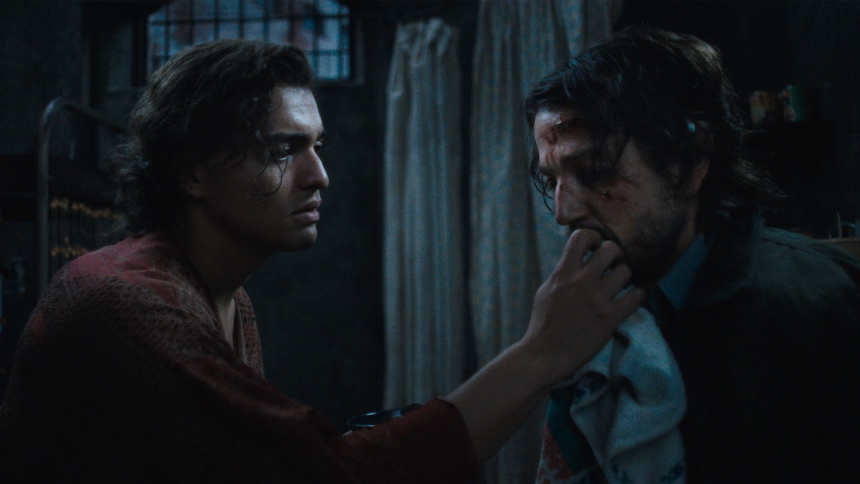Sundance 2025 Review: KISS OF THE SPIDER WOMAN, Politics, Queerness, and Jennifer Lopez

As illiberalism, authoritarianism, and full-scale fascism take hold on both sides of the Atlantic, art becomes essential as a form of resistance, opposition, and defiance against the powers-that be. Art gains increasing importance and relevance as autocrats and their supporters attempt to eliminate dissent.
That art includes an oft-adapted work like Manuel Puig’s 1976 postmodern novel, Kiss of the Spider Woman, which was initially banned in Argentina under the then-current military dictatorship, adapted for the stage in 1983 by Puig himself, adapted into an Oscar-winning film helmed by Hector Babenco (Pixote) two years later, adapted into a commercially successful, Tony Award-winning stage musical in 1993, and now, not exactly coming full circle but coming close, reimagined as a stunningly realized cinematic adaptation written and directed by Bill Condon (Dreamgirls, Kinsey, Gods and Monsters).
Pace previous interpretations of Puig’s tale, Kiss of the Spider Woman centers on Valentín Arregui (Diego Luna), a leftist detained for political activism against the military regime, and Luis Molina (Tonatiuh), a queer prisoner arrested for “public indecency” (“corruption of a minor” in previous iterations). Molina and Valentín differe in their worldviews, temperament, and interests, thrown together in the same jail cell by a calculating, shrewd prison warden obsessed with uncovering the identities of Valentín's associates in the resistance.
Valentín initially responds with reflexive anger and disgust to Molina’s presence in his cell, the result of a lifetime's worth of anti-LGBTQ+ conditioning. Valentín might be a revolutionary in his own mind, fighting for right over wrong (the working class over the military and fascist-aligned elites). His adherence to a reductive Marxism, however, doesn’t include someone outside “traditional,” heteronormative gender roles like Molina (identified here as gay, but trans-coded to align with more enlightened contemporary standards). Valentín also dismisses Molina’s apolitical stance and the latter's escapism into the films of Ingrid Luna (Jennifer Lopez), a decades-old movie star who imprinted herself on Molina at an early age, as frivolous and trivial.
As Valentín almost imperceptibly transforms from reluctant to willing listener for Molina’s fancifully embroidered storytelling, a second, film-within-a-film emerges, the titular Kiss of the Spider Woman. Luna plays a fashionista of the highest order, Molina her besotted assistant, and Valentín an amorous photographer who journeys with Aurora to their mutual birthplace, a small, out-of-the-way Argentinian town controlled by a ruthless thug in a suit and his goons, paralleling Molina and Valentín and their experience under the military regime. Within the imagined film-within-a-film, love arrives in delirious Technicolor fashion. Reflecting Molina and Valentín, however, it seems doomed to failure and tragedy.
To Condon’s considerable credit as a filmmaker, he implicitly trusts the audience to sit back and observe Molina and Valentín’s relationship as it changes over hours, days, and weeks without stopping the film to specifically call out, define the nature of their relationship or place limtis around it. Their relationship evolves organically, surprisingly for those unfamiliar with the source material or earlier adaptations, unsurprisingly for those who are, but with far greater subtlety, wit, and empathy than previous interpretations of Molina and Valentín's story.
Gorgeously shot by cinematographer Tobias A. Schliessler, directed with throw-back, old-school flair by Condon, and expertly choreographed to sonorous Latin-American rhythms, the film-within-a-film sequences can practically stand on their own as a mini-film. Even as those scenes reflect and refract developments in Molina and Valentín’s relationship, including the growing threat from the military regime and its representatives within the prison system, they offer Lopez, Luna, and Tonatiuh the opportunity to showcase different sides of their talents as performers.
Playing a hyper-heightened version of her outsized public persona, Lopez brings the requisite movie-star glamor as Aurora in the film-within-a-film and as Aurora’s doppelgänger, the Spider Woman of the title. Luna handles the demands of the more restrained role as Valentín and Armando (in the film-within-a-film) admirably, evoking sympathy for his revolutionary idealist in the “real” world and the lovestruck Armando elsewhere.
It’s the remarkable Tonatiuh, however, who ultimately stands out as Kiss of the Spider Woman’s key performer. There’s practically nothing Tonatiuh can’t do and do well, from the more feminine, flamboyant presenting Molina to his more more masculine, subdued counterpart in the film-within-a-film. Tonatiuh’s fine singing voice elevates the stage musical’s songs from passable to simply put, extraordinary, imbuing the songs with deep reservoirs of feeling, emotion, and color.
Kiss of the Spider Woman premiered at the 2025 Sundance Film Festival. Visit the film's page at the official festival site for more information.
Kiss of the Spider Woman
Director(s)
- Bill Condon
Writer(s)
- Bill Condon
- Terrence McNally
- Manuel Puig
Cast
- Jennifer Lopez
- Diego Luna
- Tonatiuh

Do you feel this content is inappropriate or infringes upon your rights? Click here to report it, or see our DMCA policy.






